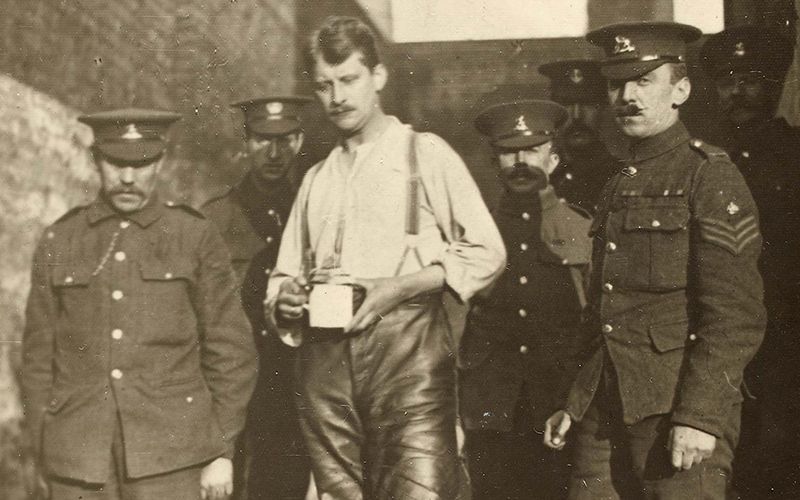The first thing that struck me about The Abbey Theatre’s decision to plan the controversial Waking The Nation arts festival with only one work by a woman in the lineup was how Irish it was - the sleepwalking complacency, that is.
It is so blatant that even revered actress Meryl Streep has joined the protest.
A photograph of Streep – currently appearing in cinemas as Emmeline Pankhurst in Abi Morgan’s film Suffragette – alongside the US actor Christine Baranski was published on Twitter, with a message reading: “I support Irish women in Irish theatre.”
Meryl Streep, Christine Baranski, Laoisa Sexton and @lisatk are #WakingTheFeminists @WTFeminists @lianbell pic.twitter.com/dJyOIl7k5P
— Lisa Tierney-Keogh (@lisatk) November 12, 2015
Meanwhile 600 members of the arts in Ireland protested outside the theater at the fact that of ten plays commissioned for the Irish Rising centenary only one is by a woman.
There is a great deal to be said for giving an artistic director all the scope he or she needs to pursue inspired programming. After all Abbey Director Fiach Mac Conghail’s tenure has been one of the most successful in the theatre’s storied history.
But you would think that in a rarefied atmosphere like Ireland’s national theatre that someone would at least have noticed that the contributions of Irish women were being written out of the festival script?
You would think that if you didn’t know Ireland, that is. The disfavoured finding themselves written out of the national story is as frequent an occurrence as hearing the Enya track they play over the air safety announcement on departing Aer Lingus flights. It happens so often we have largely stopped noticing it.
In Ireland our government, our churches and even or national theatres have always operated an authoritarian Don’t Ask Us, We’ll Tell You policy. It’s the sine qua non Irish governance style, since the foundation of the state: daddy knows best.
If you’re judged competent by those who matter, there’s no need to for anyone to concern themselves over controversial questions that could arise from your decision-making. Instead we should just reflexively trust the boss to make the right calls and play our part. Many feminists call this top down authoritarian style by one handy dandy word: patriarchy.
Which is apparently what happened at the Abbey, because although it’s board includes several noted female members including Jane Brennan, Loretta Dignam, Deirdre Kinahan, Niamh Lunny and Sheelagh O’Neill, apparently they were not in a position to alter or balance the male dominated program as it was shaped.
Remarkably, the Irish government underwrote the festival to the tune of 500,000 Euro without even thinking to ask why the work of only one woman had been programmed.The funding was reportedly awarded to the Abbey after “a series of verbal discussions” with the Department of Arts, Heritage and the Gaeltacht (headed by Minister for the Arts Heather Humphreys) without a discussion about what exactly they were paying for.
I mean, why bother? It was enough to know the nation needed a big festival, scheduled for the looming centenary of 1916, so there was no need to trouble ourselves with what shows it would present, or which writers would participate. The Abbey is asking and the Arts Council is paying. That’s all you know and all you need to know. Places everyone.
But since no one else bothered, let’s take a look at just what’s lurking under the shadow cast by all that complacency, shall we? Because all of this has happened before.
In the early 1990’s the same blank incomprehension was seen on the faces of the all-male board of the Derry based Field Day Theatre company, after they complied over twelve centuries worth of Irish writing and largely neglected to include works by Irish women.
The exclusion was a disgrace and deservedly jeered at. Because it was not just an arid philosophical debate, after all. Being passed over, continually overlooked, actually damages people, it robs them of their contributions.
As men are invited to address the nation women continually find themselves pushed to the margins where they are no longer seen or heard. As the male playwright’s star rises the female playwright is eclipsed.
Growing up in Ireland I saw this lamentable disappearing act occurring over and over again in our culture. It happened to single mothers, to the disadvantaged, to people with special needs, to just about anyone who disturbed our comfortable complacency, our cherished images of ourselves.
Growing up I learned that the worst fate that can befall you in Ireland - absolutely the worst - was to find yourself written out of the story. By that I mean the story of your family and of your town and behind that I suppose I mean the story of your nation.
Because it’s not just neglect, it’s malignant neglect. It literally costs people, and more than just the person who is overlooked or pushed out. Whether it’s through an oversight or a value judgment, the effect is ultimately the same. Silence falls and you vanish into it.
In Ireland when I was growing up I heard endless of talk about unity, that unity meant strength: it was our diversity that seemed to threaten us. It staggers me to think that in 2015 the contributions of Irish women still fall under that diversity umbrella, but here we are, the programming of this predominantly male festival makes it clear it’s the case. Since 2006 only 12.3 percent of the plays performed on the Abbey stage have been by women.
So we are still debating if women are our equals, if they are worthy of a larger hearing. And if we overlook their contributions we don’t seem to anticipate any serious consequences.
But the complacency that led the Abbey into this crisis ultimately did something worthwhile, it has precipitated one of the most important conversations to happen in Irish culture in my lifetime, an event one wag called the Estrogen Rising.
And the national theatre’s response to this remarkable cultural awakening? Yesterday a theatre spokesperson told the press they “have no plan to amend” their festival line up. Slán libh mo chairde.
So the battle for 2016 has just begun. I wouldn’t take bets against Irish women.




Comments